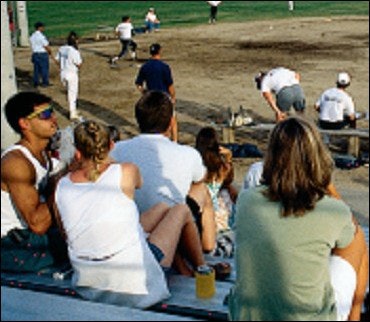New concealed-weapons laws boost some rec officials' safety concerns

Originally intended to usher in a new era of public safety for Missouri's nearly six million residents, House Bill 349 - which would allow permit holders to carry concealed weapons anywhere in public except government buildings (including indoor recreation facilities), churches, schools, airports and bars - has become the source of spirited debate. Proponents say the bill takes power away from criminals and places it squarely in the hands of law-abiding citizens. The bill's opponents say it will put more guns on the streets, thus spurring more crime.
Regardless of their personal views on the issue, from a professional perspective Missouri parks and recreation professionals are prone to side with those against the bill, especially considering that, according to the bill's language, none of the state's thousands of public parks and athletic fields are considered off-limits to concealed weapons. "We work pretty hard to ban cigarettes and alcohol from sporting events," says Dan Kinney, director of the Springfield-Greene County Parks Department. "We don't want to give the impression that we're going to take care of those things, but it's alright to come to a game packing heat."
What has rec departments concerned are the conflicts between parents, coaches and referees - and the effects, if guns were to come into play, that such run-ins could have on youth sports. "There are no means by which we can bar weapons from your child's soccer game and the facilities where these events are held," says Missouri Recreation and Park Association executive director Dave Ostlund. "We know that's where a lot of tempers flare." "There are already enough problems in youth sports," adds Bill Lockwood, director of the Jefferson City Department of Parks, Recreation and Forestry. "All we need is to introduce firearms to make the situation even more volatile."
Some might feel that the anxiety among Missouri parks and recreation professionals is unjustified. After all, on the whole, episodes of extreme violence are rare within youth sports. Plus, thanks to an 11th-hour lawsuit and the subsequent injunction ruling of a St. Louis circuit court judge, Missouri's concealed-weapons law - originally scheduled to take effect Oct. 11 - has yet to be enacted. The matter has been forwarded to the Missouri Supreme Court, which on Jan. 22 is expected to begin hearing arguments from both proponents and opponents of HB 349.
But none of that has precluded Missouri recreation officials from exploring all avenues by which to prevent their worst fears from materializing. The Missouri Municipal League has aided MRPA in developing a model ordinance that member recreation agencies can tailor to their individual needs and then forward on to their respective municipal governments for adoption.
For example, using the language of HB 349 to its advantage, Jefferson City has drafted an ordinance that would ban concealed weapons from a number of its outdoor recreation facilities. In addition to the aforementioned buildings, the concealed-weapons bill includes amusement parks and sports facilities with spectator capacities greater than 5,000 under its wing of exempt facilities. Jefferson City officials have therefore classified outdoor picnic pavilions as buildings, and outdoor pools, skating rinks and several ballparks as amusement parks. "If we're able to prohibit weapons in some of our facilities," says Lockwood, "it's better than nothing."
Still, others feel their hands are tied, regardless of ordinances. While the concealed-weapons bill allows municipalities to prohibit weapons in certain facilities, it does not empower local government officials to do anything more than ask transgressors to leave or cite them for trespassing. "We'll certainly post the signs, but the ones who are likely going to carry are going to anyway, no matter what we do," says Kinney.
Missouri officials aren't the only ones feeling powerless. Concealed-weapons laws, in some shape or form, currently exist in 45 states, and pending legislation could soon add one more state (in addition to Missouri) to the fold. The Ohio House and Senate recently passed two different versions of a concealed-weapons bill. As of this writing, a joint committee was preparing to work out the differences before sending a revised bill to the governor.
As recently as September, Wisconsin lawmakers, too, were on the verge of passing similar legislation. But just two months after both branches of that state's legislature approved a concealed-weapons bill, Gov. Jim Doyle followed through on repeated pledges to veto the legislation, calling it seriously flawed and "unworkable."
Recreation officials in Colorado, Arkansas and Texas are just now adjusting to life after the passage of concealed-weapons laws in each of those states. In June, the Colorado General Assembly passed two laws, one of which takes discretionary power to ban concealed weapons in public buildings away from cities and counties. Instead, those decisions are solely up to the state government. Guns are banned only in public schools and the state capitol. However, the statute does gives municipalities the authority to enforce concealed-weapons bans within their buildings if they implement security measures such as metal detectors and locking doors.
Former Aurora city councilwoman Barbara Cleland, whose term ended just this past November, says that few municipalities can afford to install such security devices. "My concerns are that the Legislature has taken away local control. But one of the things I think is ironic is that the legislators protected themselves," she says, referring to the state capitol's concealed-weapons ban.
Arkansas legislators, who in July passed a law allowing concealed-weapon permit-holders to take their guns into parks and restaurants, ultimately left it up to individual municipalities to decide whether or not to ban concealed weapons from their outdoor recreation facilities. Officials in North Little Rock, for example, have opted to disallow guns in certain areas of their parks, but not all. Within the city's 1,600-acre Burns Park, prohibitive signs are posted at all athletic fields, a tennis center and a "hospitality house" used for private gatherings. Concealed weapons are permitted, however, within Burns Park's recreational vehicle park. "What are we going to do, pull people over if they're driving through and carrying a handgun?" says Bob Rhoads, North Little Rock's parks and recreation director. "We have many travelers coming through from across the country. We knew we couldn't restrict weapons for the whole area."
The Texas Legislature passed its first version of a concealed-weapons law in 1995, but not until September were permit holders allowed to carry their weapons onto almost any local government property, the exceptions being courtrooms and places where government meetings are held. That month, Fort Worth Mayor Mike Moncrief voiced to the Fort Worth StarTelegram his concerns regarding the new law, but his city's parks and community services department has yet to respond with any policy changes. "It's something that's been brought up in staff meetings," says Jesselyn Purvey, director of the Highland Hills Community Center. "But I have no idea what's to come."
Perhaps nothing. It could turn out that the worst fears of recreation professionals - gunfire erupting on a soccer field, stray bullets striking innocent youths - won't come to pass in states that have either passed concealed-weapons laws or are on the cusp of doing so.
Nevertheless, some feel that the potential ramifications of such laws deserve some measure of consideration. "Most people haven't thought about it. They're just now starting to think about how it'll affect them," says Wisconsin Park and Recreation Association executive vice president Steven Thompson, when asked of the response from rec professionals to that state's proposed concealed-weapons legislation. "It's just like when teachers first dealt with guns in schools. They, too, hadn't thought through that issue."




































